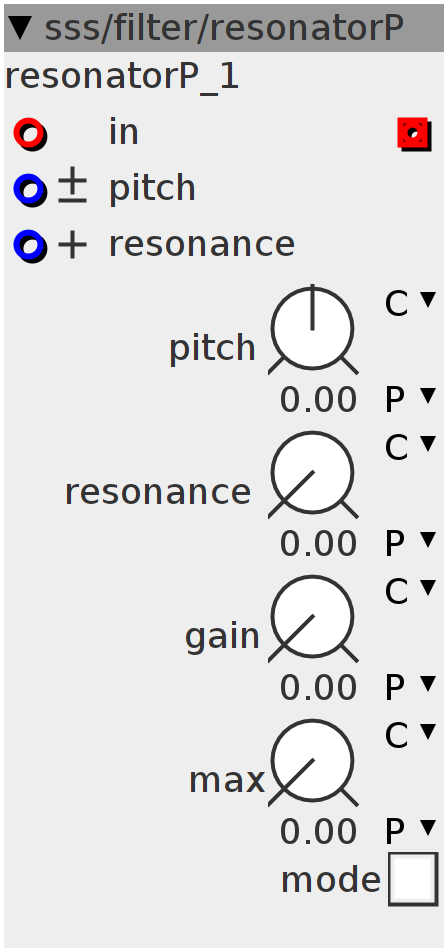resonatorP
Complex Resonator filter Filter can be used for formant creation, allpass effects, frequency-resonator, plucked string (using dirac module), percussion, etc.. pitch control is in semitones (0=440hz, this is changable to other values if you want, just embed the module and change the "440" of the "f0=440*power;" in the k-rate code to the required base-frequency). resonance sets resonation length (the higher the tone, the shorter it will be->logarithmic response). When fed a dirac pulse it will make a sine that quickly fades out. gain and max controls are from the "fatbasterd" distortion, to saveguard the output and enabling a nasty resonating distortion. Max sets max-output value (where the amplitude will be dampened at a max level) Gain sets the rate at which the output goes to the max, respectively to the input.
Inlets
frac32buffer audio in
frac32.bipolar semitone control over pitch
frac32.positive resonance length control
Outlets
frac32buffer out
Parameters
bool32.tgl mode
frac32.s.map pitch
frac32.u.map resonance
frac32.u.map gain
frac32.u.map max
int32_t real;
int32_t imaginary;
float32_t f0;
float32_t sinw0;
float32_t cosw0;
float32_t pi;
float32_t Fs;
float32_t f1;
int32_t out;pi = 3.1415926535897932384626433832795028841971693993751058209749445;
Fs = 48000;
imaginary = 0;
real = 0;int32_t frq;
int32_t pitch = __SSAT(inlet_pitch + param_pitch, 28) - (12 << 21);
float32_t power = powf(2, ((float)(pitch)) / (12 << 21));
f0 = 440 * power;
int32_t res = __USAT(param_resonance + inlet_resonance, 27);
res = res;
float32_t ras = ((float)res) / (1 << 27);
float r =
0.0001 * power + 1 - (1 - ((float)res + (1 << 30)) / (9 << 27)) / power;
// f1=-((float)110)/f0;
// float r=1.000+(ras*f1);
float32_t w0 = 2 * pi * f0 / Fs;
sinw0 = sinf(w0) * r;
cosw0 = cosf(w0) * r;imaginary = real * sinw0 + imaginary * cosw0;
real = (inlet_in >> 4) + real * cosw0 - imaginary * sinw0;
outlet_out = imaginary;
if (param_mode == 0) {
out = imaginary;
} else {
out = real;
}
int dir = out > 0 ? 1 : -1;
int32_t in = out > 0 ? out : -out;
int32_t gian = ___SMMUL(param_gain << 3, param_gain << 2);
float32_t gain = ___SMMUL((gian + (1 << 17)) << 2, in << 3);
gain = 1 + gain / (1 << 19);
outlet_out = ((param_max) - ((param_max)-in) / gain) * dir;